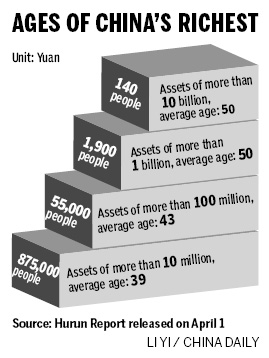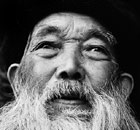Society
97% of China's richest do charity work: Report
By Yu Tianyu (China Daily)
Updated: 2010-04-02 07:15
 |
Large Medium Small |
Most of country's wealthiest live in Beijing, Guangdong and Shanghai
Beijing is home to the largest number of the country's wealthiest lot, with 151,000 people owning more than 10 million yuan ($1.46 million) and about 94,000 people with more than 100 million yuan in personal assets, according to a recent report.
The 2010 Hurun Wealth Report, which specializes in tracking the wealthy, said there are 875,000 multimillionaires and 55,000 billionaires in China today, 6.1 percent and 7.8 percent more than last year.
| ||||
The group in Beijing, Guangdong and Shanghai account for 48 percent of the total number of China's richest, who seem relatively unscathed by the recent global downturn, it said.
Rupert Hoogewerf, the founder of the Hurun Report, told China Daily that the rise in the number of China's wealthiest is dependant on the soaring property prices, better performance of the stock market and the booming Chinese economy.
According to official statistics, Chinese GDP grew by 8.7 percent in 2009 to 33.5 trillion yuan, and the Shanghai Composite Index rose over the same period from 2300 points to 3000, an increase of 30 percent.
China's house prices in February this year also rose by 10.7 percent year on year.

Hoogewerf admitted that most of China's wealthiest citizens were making money from the property sector.
The report also said that China has 1,900 people with 1 billion yuan and 140 people with 10 billion yuan in personal assets, nearly doubling the figure in 2009.
Hoogewerf said there seems to be a hidden class of low-key rich, who keep their heads below the parapet.
The average age of China's wealthy is 39, 15 years younger than their counterparts outside of China. The male to female ratio of the country's richest is 7:3, it said.
They made their money primarily from the property and manufacturing sectors, and they are super confident about China's economic outlook, the report said.
They enjoy collecting watches, jewelry, Chinese calligraphy and paintings and, on average, they own three cars and 4.4 luxury watches, it said.
Travel, golf and swimming are their leisure activities of choice and they take an average of 16 days holiday a year.
Only 3 percent of China's super rich never do any charity work, as it has become a way of life for most of them.
For their children's education, the United Kingdom is the first choice for secondary school and the United States for university.
"China's rich are becoming increasingly sophisticated in the way they spend their money and at a remarkable pace," Hoogewerf said.
China Daily











